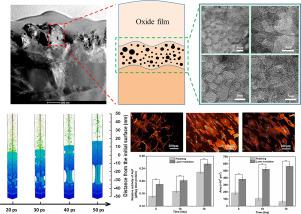Biomaterials Advances ( IF 7.9 ) Pub Date : 2021-06-10 , DOI: 10.1016/j.msec.2021.112247 Hao Yao 1 , Xianrui Zou 1 , Shijian Zheng 1 , Yazhou Hu 1 , Shiliang Zhang 1 , Chunyong Liang 1 , Huan Zhou 1 , Donghui Wang 1 , Hongshui Wang 1 , Lei Yang 2 , Qiang Li 1

|
The osteogenic activity of medical metal can be improved by lowering its surface stiffness and elastic modulus. However, it is very difficult to directly reduce the elastic modulus of medical metal surfaces. In this paper, with selected parameters, the titanium surface was treated via femtosecond laser irradiation. Micro indentation revealed that the femtosecond laser ablation can effectively reduce the surface Young's modulus and Vickers hardness of titanium. Besides, In order to explain the mechanical properties of degradation of titanium surface, Large-scale Atomic/Molecular Massively Parallel Simulator (LAMMPS) was used to simulate the process of laser ablation process of titanium surface, and it was found that after the ablation of titanium surface, voids were produced in the subsurface layer. The simulation showed that the voids are formed by the cavitation of metastable liquid induced by high tensile stress and high temperature during femtosecond laser irradiation. Subsurface voids with a thickness of about 40 nm were observed under the oxide layer in the experiment. Cell experiments showed that the surface with low Young's modulus was more conducive to cell proliferation and osteogenic differentiation.
中文翻译:

飞秒激光诱导纳米多孔层用于增强钛植入物的成骨
医用金属的成骨活性可以通过降低其表面刚度和弹性模量来提高。然而,直接降低医用金属表面的弹性模量是非常困难的。在本文中,选择参数,通过飞秒激光照射处理钛表面。显微压痕表明飞秒激光烧蚀可以有效降低钛的表面杨氏模量和维氏硬度。此外,为了解释钛表面降解的力学性能,采用大规模原子/分子大规模平行模拟器(LAMMPS)模拟钛表面激光烧蚀过程,发现烧蚀后的钛表面钛表面,在次表面层中产生空隙。模拟表明,在飞秒激光照射过程中,高拉应力和高温引起亚稳态液体的空化作用形成了空隙。实验中在氧化层下方观察到厚度约为 40 nm 的次表面空隙。细胞实验表明,杨氏模量低的表面更有利于细胞增殖和成骨分化。



























 京公网安备 11010802027423号
京公网安备 11010802027423号